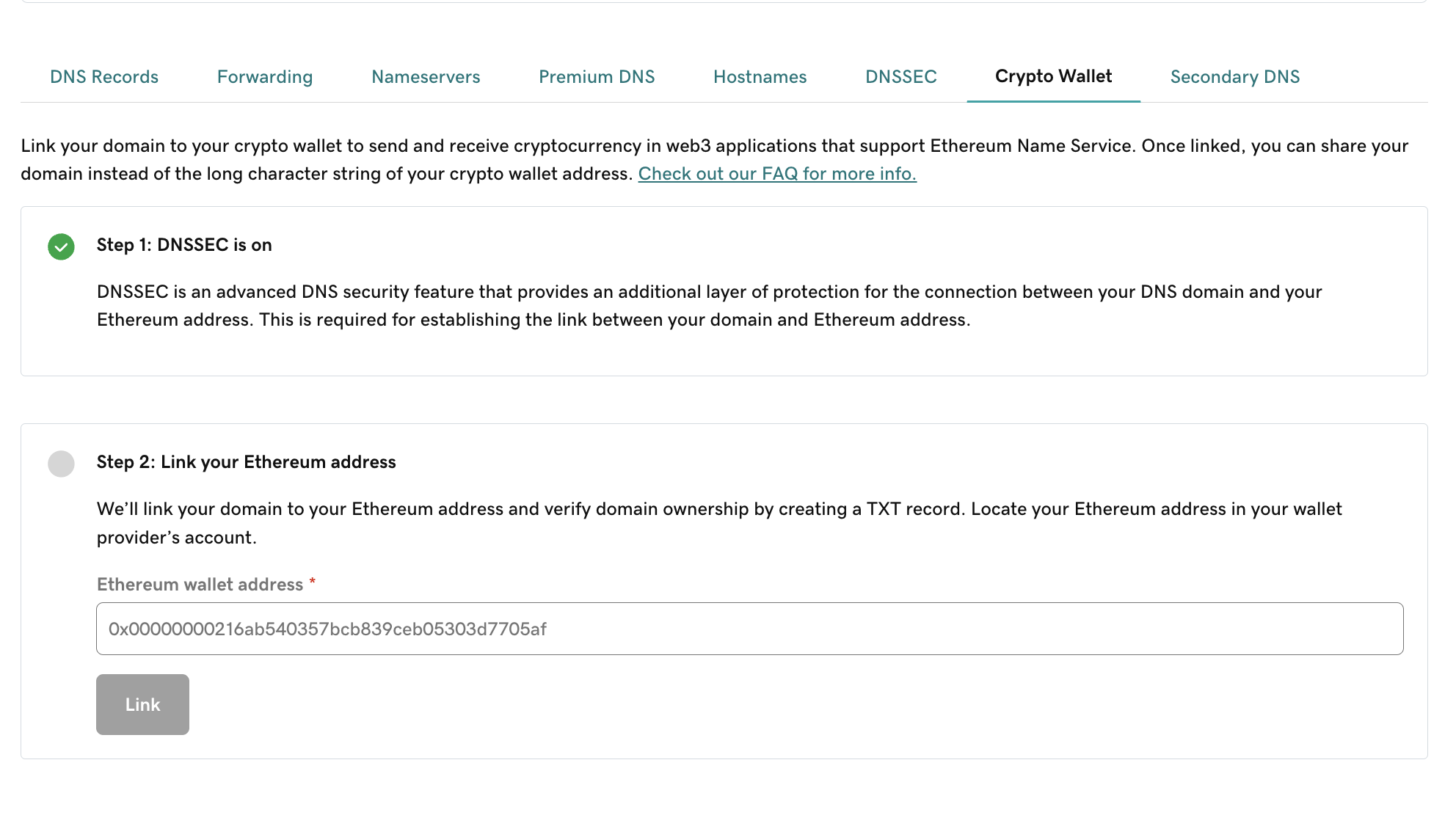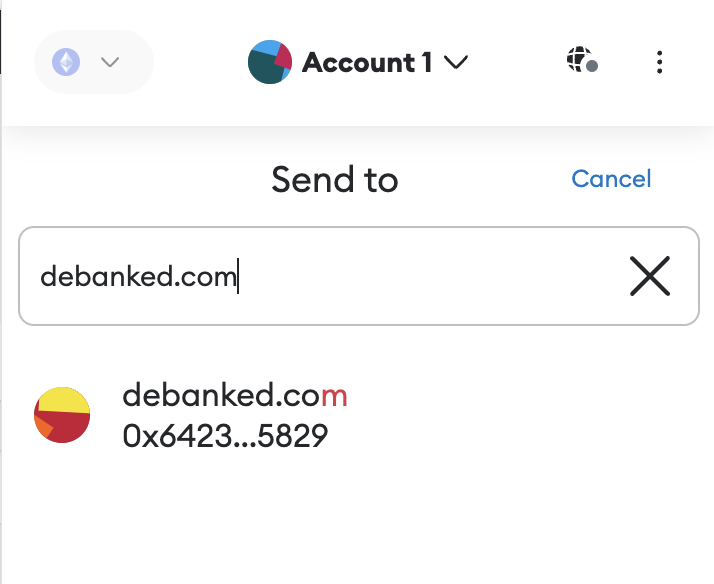Sean Murray is the President and Chief Editor of deBanked and the founder of the Broker Fair Conference. Connect with me on LinkedIn or follow me on twitter. You can view all future deBanked events here.
Articles by Sean Murray
Don’t Just Say You Can Do SBA Loans, Learn How to Broker Them
April 6, 2024 “As in anything else, once you master the learning curve, you’re fine,” says Bob Coleman. “The reason why SBA lending is difficult is you may not know the rules.”
“As in anything else, once you master the learning curve, you’re fine,” says Bob Coleman. “The reason why SBA lending is difficult is you may not know the rules.”
And that’s where Coleman comes in, a former lender turned news source and educator of SBA loan brokers, he offers his own online course called the Certified SBA Loan Broker Training, which is open to commercial loan brokers of various backgrounds that want to master SBA. Without training, brokers unaccustomed to the process can get lost and bogged down if they try to figure it out on the fly.
For instance, “If you drop something off at your lender, the lender is going to come back with 15 things and you may not know exactly what they want,” Coleman says, “and therefore the difficulty arises when you don’t know exactly what the lender wants and you ask the borrower and then it becomes a long drawn out affair.”
It’s precisely this scenario that scares brokers accustomed to light paperwork and perks like 2-hour approvals in the short-term working capital space from even attempting to try their hand at SBA. But even the merchants can be scared off by a longer more arduous process. Coleman also acknowledges that there has been a collective awakening throughout the mainstream commercial finance space that speed is on every business owner’s mind.
But speed can be a matter of experience and just knowing what to do, how to do it, and who to do it with. Besides, in an era of creeping one-stop-loan-shops that can do it all, it will become increasingly difficult for today’s broker to tell a customer that they don’t really know how to do the harder stuff and to always default to a short term loan or MCA when the broker next door is ready to put an SBA loan together if that’s the best course of action. As most brokers are aware, many short-term working capital brokers also offer equipment financing at the very least and vice-versa these days.
 “A successful broker is one that cultivates a relationship with a few lenders,” Coleman says. “A broker is more entrepreneurial [versus an in-house business development officer], has access to a number of different products, and they work with a core level of lenders or funders.”
“A successful broker is one that cultivates a relationship with a few lenders,” Coleman says. “A broker is more entrepreneurial [versus an in-house business development officer], has access to a number of different products, and they work with a core level of lenders or funders.”
And that all comes down to training, which Coleman’s course offers for SBA.
“The loan broker course is geared for loan brokers who have a basic knowledge of commercial lending,” Coleman says. “We’re not going to go through and tell them how to analyze an income statement or a balance sheet, but we are going to tell them what SBA lenders are looking for.”
Coleman’s course is designed to take 12 weeks, though with it being online those enrolled can move at their own pace. As a benefit those taking the course get access to Coleman himself and can ask him questions and can join his weekly live show. There’s also the Coleman Roundtable where brokers and lenders dial in together once a week so that lenders can provide updates on what type of deals they’re looking for.
“It’s always a moving target of what the lenders will do,” Coleman says, “As we go through economic cycles, lenders tweak their credit boxes of what they want, and the brokers have to understand the lenders have a tremendous amount of pressure from a lot of stakeholders on how they want their portfolios to look.”
To that end, any broker that maybe tried their hand on an SBA loan in the past and walked away discouraged shouldn’t give up on it entirely.
“SBA is constantly changing,” Coleman says. “If you had a bad experience three or four years ago with a particular lender, forget about it and find out what’s new.”
Bob Coleman will be speaking alongside Sean Murray at Broker Fair New York City on May 20 if you’d like the opportunity to learn more from him and pick his brain in person.
Federal Regulator Tasked With Small Business Finance Oversight is Now Protesting Itself?
April 5, 2024If you saw a protest outside the office of the CFPB in Washington DC lately, you’d be forgiven for assuming it was a group of aggrieved consumers. Alas, it’s something much more bizarre, the CFPB protesting itself. That’s because the regulator is currently engaged in a labor union dispute with its own employees over fair pay. Mind you this is the same regulator that is tasked with adjudging fairness in the private sector. CFPB employees are members of Chapter 335 of the National Treasury Employees Union (NTEU) and this union is currently engaged in heavy mobilization and protest efforts against the CFPB.
The campaign slogan is Pay Up, CFPB, which has been printed on banners that are being paraded by CFPB enforcement attorneys outside the CFPB office on 1700 G St NW. The NTEU actually has a formal online signup sheet for CFPB employees to pick their time to picket outside. On April 3rd, the union even took a page out of the New York City playbook when it apparently wheeled in a Scabby the Rat inflatable.
Apparently this guy was in front of CFPB headquarters yesterday. pic.twitter.com/5mq7R2h1Tf
— Evan Weinberger (@reporterev) April 3, 2024
As recent as March 27, the National President of the NTEU scolded CFPB Director Rohit Chopra in a letter that accused him of being uncooperative in negotations.
“I believed you when you said you valued CFPB employees and that you respected NTEU as CFPB’s exclusive representative. However, your actions have not supported your words. I have reached out to your office multiple times, both by letter and by phone without receiving a proper response. To build a strong relationship, we must prioritize communications to work through issues, especially when we disagree. Instead, you have avoided all communication. I have even offered to meet with you on the weekend to let you know my commitment to this relationship and to stress to you how important having ongoing discussions is to help resolve this dispute. Your lack of response is unacceptable.”
– NTEU President Doreen P. Greenwald to CFPB Director Rohit Chopra
The irony of this all cannot be overstated. While the CFPB is literally preparing to enforce 888 pages of regulations in small business lending to assess fairness in the marketplace, the union representing the CFPB’s employees has declared that the CFPB’s leadership does not believe in fairness.
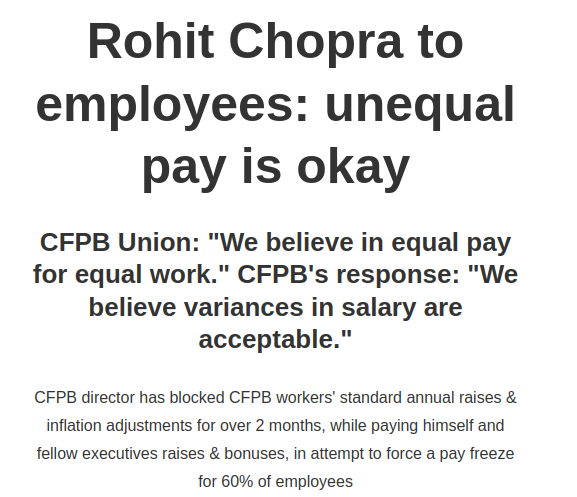
Meanwhile, the CFPB just settled a separate lawsuit with its own employees over previous claims that it had discriminated on the basis of race.
Stop the Debt Settlement People, Funders Come Up With Merchant-Friendly Alternative
April 3, 2024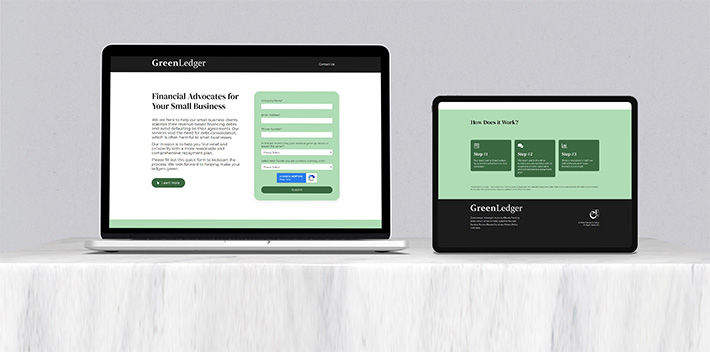 Are debt settlement “advisors” interfering with your contracts and putting your merchants in a bad spot? The industry is now taking the reins on a solution. It’s called GreenLedger, a platform for funders to work together on resolving a merchant’s situation with no debt settlement middlemen encouraging an intentional default, taking fees, and making false promises.
Are debt settlement “advisors” interfering with your contracts and putting your merchants in a bad spot? The industry is now taking the reins on a solution. It’s called GreenLedger, a platform for funders to work together on resolving a merchant’s situation with no debt settlement middlemen encouraging an intentional default, taking fees, and making false promises.
Founded by Elevate Funding CEO Heather Francis, who aims to eventually make it a non-profit, merchants would go to this industry-collaborative platform, indicate who they have open contracts with, and the platform would notify the funders directly.
“From there, the primary points of contact at each funder can get together to come up with a more specific and comprehensive payment plan that works with the merchant’s needs,” said Francis. “GreenLedger’s mission is to work directly with our small business clients to stabilize their revenue-based financing arrangements and avoid breaching their agreements, eliminating the need for potentially predatory middlemen.”
The platform has already been generating interest.
“As an attorney deeply committed to the financial empowerment of small and medium-sized businesses, I am thrilled to endorse Elevate Funding’s creation of GreenLedger,” said industry attorney Patrick Siegfried. “This initiative represents a pivotal step in our ongoing battle against the increasing prevalence of unscrupulous entities in the commercial finance debt settlement industry. Far too often, these bad actors employ deceptive sales tactics and bind clients with unfair contracts, leading not to the promised debt relief but to further financial strain for small businesses. GreenLedger, with its dedication to transparency and integrity, stands as a true avenue for business owners seeking legitimate and effective financial solutions. Its mission to root out malpractices and safeguard the interests of small businesses is not just commendable but essential in today’s challenging economic landscape.”
To learn how you can participate and cut the debt settlement people out of the picture, attend this webinar on April 16th.
The CFPB Now Wants to Work With Loan Marketplaces?
March 27, 2024 Things are getting weird in government land. The CFPB, the regulator in charge of collecting data from small business finance companies starting this Fall, has just revealed what one of its long term goals of that might be, incorporating the data into loan marketplaces.
Things are getting weird in government land. The CFPB, the regulator in charge of collecting data from small business finance companies starting this Fall, has just revealed what one of its long term goals of that might be, incorporating the data into loan marketplaces.
That’s because on Wednesday, CFPB Director Rohit Chopra said that he plans to do exactly that with another industry the agency collects data on, the credit card industry.
…reliable information about interest rates is also just hard to come by. So, we instead see people comparing cards by annual fee, or rewards, or perhaps just signing up for a card from the same bank where they have a checking account, assuming the interest rate they’re charged will be competitive. To help make this process easier, we are assembling a pricing data set for third-party comparison websites and others to use to help consumers find the best deal for them. This will rely on data submitted under existing requirements of the 1988 law. I hope to share more about those plans in the coming months.
While it may be a leap at this stage to say that this will happen in the small business finance industry any time soon, virtually none of the speculation surrounding what the CFPB will actually do with the data it collects, if anything at all, has been that it would be integrated into loan marketplaces for merchants to compare options. Given current trends across all levels of government this is not so preposterous. For example, the City of New York just introduced its own business loan marketplace and the SBA just upgraded theirs. Couple this with a slew of recent regulatory enforcement activity in the private sector and the idea that there is a plan for government-run business loan marketplaces that are powered by federal agency loan data for comparison shopping is not incomprehensible.
On Long Island? You Might See Signs
March 26, 2024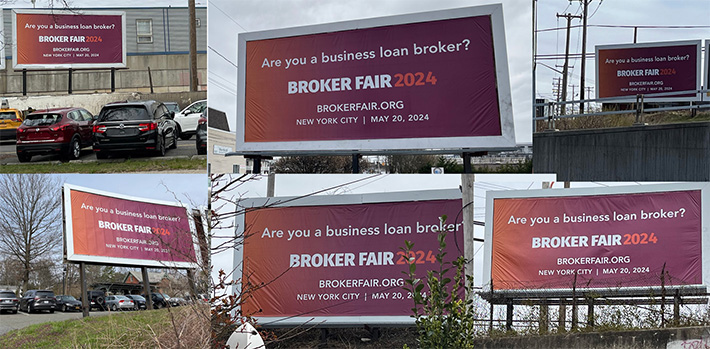
Billboards for Broker Fair 2024 have gone up across several Long Island towns this past week, including locations in Glen Cove, Syosset, Westbury, Bay Shore, and Valley Stream. The conference, built specifically around a broad range of commercial finance brokers, will take place on May 20 in New York City. Long Island is among the largest geographical employers of brokers in the United States.
Broker Fair attendees can expect to learn from industry pro Peter Ribeiro, meet a wide range of funders/lenders & vendors, pitch their deals, and find out what they need to be doing to remain compliant and become successful.
Broker Fair 2024 will take place at the Metropolitan Pavilion in New York City. Brokers pay the lowest price for entry. There is also a pre-show party the night before on May 19th at a Lounge called Somewhere Nowhere NYC (yes that’s really the name!).
If you’re a broker, Broker Fair 2024 is an event you cannot miss!
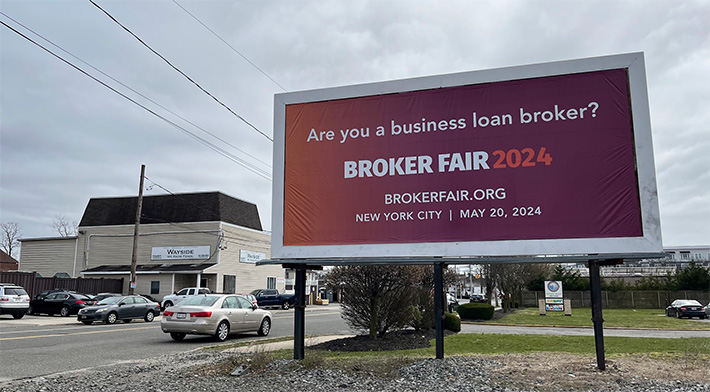
Let’s Hop on a 5 Minute Call
February 28, 2024There’s a fantastic meme account on X where “Hunter” spreads the comedic gospel of cold calling one’s way to becoming a billionaire. Hunter suggests that true sales people take freezing cold showers, tip their landlords for sub-par living arrangements as respect for creating optical conditions to grind, and to make cold calls every day, every night, during holidays, and while being seated in an ice bath at the Cheesecake Factory.
We need to teach cold calling in elementary school pic.twitter.com/fwqaaG2uA2
— Hunter (Let's hop on a quick 5 min call) (@huntercoldcalls) February 22, 2024
We all know that cold showers help you become a better cold caller
But to unlock your true potential, you need to cold shower while cold calling
Introducing, the next generation of call centers pic.twitter.com/vrTwI7b094
— Hunter (Let's hop on a quick 5 min call) (@huntercoldcalls) February 21, 2024
A national cell phone outage just destroyed my business, my life, and the entire world
Thousands of my cold calls went unanswered today because the national cell phone network wasn't working
I would have helped each and every one of those prospects improve their lives
And I…
— Hunter (Let's hop on a quick 5 min call) (@huntercoldcalls) February 22, 2024
The account, which can sometimes be found trolling celebrities by asking them to hop on a quick 5 minute call in the comments, is likely relatable to any salesperson that’s experienced the rigors of the hustle. For instance, I can recall one particular day in 2015 when I was making cold calls from a waterfront skyscraper in Jersey City when a plane flew by the window and then LANDED right there in the Hudson River. What to do? Go look? Not possible. Had to make more cold calls!
That plane, of course, was flown by Captain Sully Sullenberger, of which the feat of landing there became known as the Miracle on the Hudson. I am proud to say that because I ignored all of it and continued to make cold calls while it was happening that I am now worth $463 trillion as a result.
My Real Estate Was Turned into an NFT. I Used that NFT as Collateral for a Loan.
February 25, 2024 Ooops, I did it again. I bought an NFT that grants me ownership of real land in Arizona in the same manner that I previously bought land in California. But this time I went a step further, I used it as collateral for a loan.
Ooops, I did it again. I bought an NFT that grants me ownership of real land in Arizona in the same manner that I previously bought land in California. But this time I went a step further, I used it as collateral for a loan.
Thanks to a proptech company called Fabrica, the owner of a plot of undeveloped land in rural Sun Valley, AZ transferred the rights to a trust for which control is governed by whomever owns the corresponding NFT. Long story short I bought that NFT. The difference between this NFT and say some digital collectible flavor of the month is that the land has some actual value in the real world. It’s not dependent on the blockchain for its worth and I can go to Sun Valley and build something there if I wanted. But with ownership governed by the NFT, I can also do something that might be a little bit more difficult otherwise for this remote and somewhat illiquid property, and that’s access liquidity in a highly efficient marketplace.
Specifically, I offered this property up as collateral for a loan on NFTfi, a peer-to-peer NFT loan marketplace at a very modest LTV of 32%. My offer was filled and I was able to access the funds with a single click of a button. If I default on the loan, the NFTfi smart contract will transfer the NFT to the lender and with that the lender would become the legitimate owner of the property in Sun Valley. The stakes in this case are real.
If you’re thinking about what kind of person would ever want to make this kind of loan, consider that more than $400 million worth of NFT loans have already been conducted on NFTfi since inception. The most commonly used collateral is digital artwork like cryptopunks and Bored Ape Yacht Club, which collectively represent $164 million of that total volume alone. When borrowers use this digital artwork as collateral the lender may end up stuck with an NFT with no physical connection to the real world. For an entire niche audience of lenders, this doesn’t bother them. However, as someone with a more apprehensive view toward risk in lending, the introduction of real physical collateral, actual property in the United States no less, is a game changer.
I am not the first person to ever engage in this type of transaction. According to Fabrica, the first property-backed NFT loan was transacted in 2021. However, if I might be afforded any claim to fame it is for conducting the first ever domain name loan over Ethereum.
GoDaddy Enables Any Website Domain To Accept Payments
February 22, 2024“Hey, do you have a Zelle or Venmo or Website?”
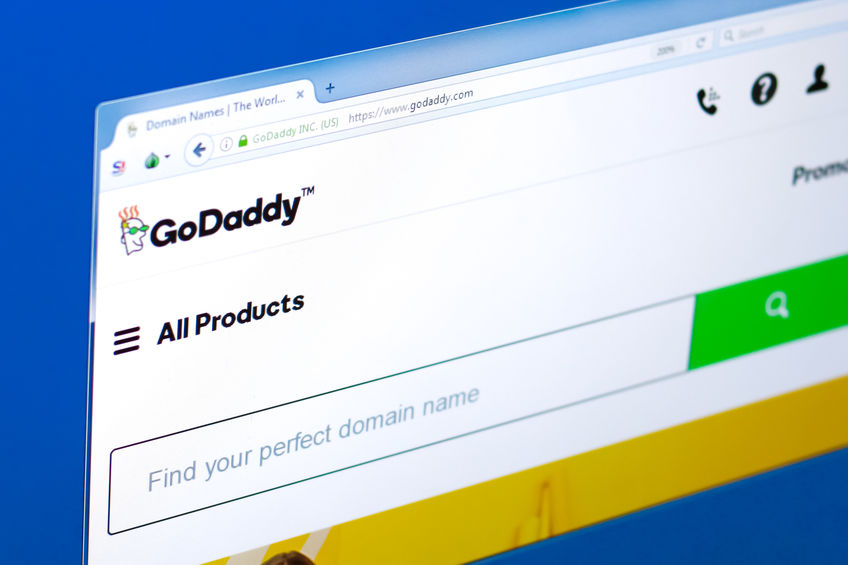 GoDaddy, the domain name registrar and popular website hosting service, has jumped into the fray to offer website owners a new easy way to receive payments. Although the new feature is called a “crypto wallet” it can accept more than just ether. That’s because one of the most popular currencies being used on the Ethereum blockchain today is USDC, a digital dollar that is fully backed by real dollars.
GoDaddy, the domain name registrar and popular website hosting service, has jumped into the fray to offer website owners a new easy way to receive payments. Although the new feature is called a “crypto wallet” it can accept more than just ether. That’s because one of the most popular currencies being used on the Ethereum blockchain today is USDC, a digital dollar that is fully backed by real dollars.
Specifically, GoDaddy is allowing any website domain owner to use their domain name as a crypto wallet address. That means instead of relying on someone’s Zelle or Venmo address, you can just send funds (ether, USDC or more) to the domain name of the website, like debanked.com for example. Again, “crypto” doesn’t necessarily mean exotic coins since the blockchain can facilitate the transfer of digital dollars as well.
To try it, just go to the DNS settings in your GoDaddy account, click the “Crypto Wallet” tab, and then just click the “turn on” button and enter in your Ethereum address in the next field. That’s it. That’s all you have to do. Now your website domain name can accept payments over the blockchain. It assumes you have an Ethereum address already, which if you don’t well then that’s an article for another day as that all happens outside of GoDaddy. In the meantime, see the below guide:

